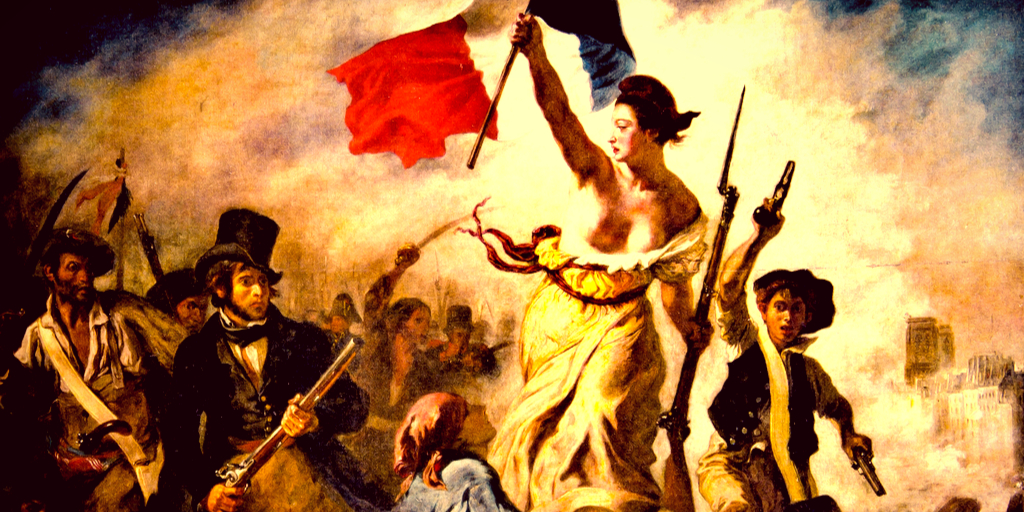Trump’s apologists, too, are jettisoning the conservatism in whose name they have boarded his train.
What Lord Acton Can Teach Us about Nationalism
Nationalism is, as we all know it, one of the most hotly debated issues these days. A rather surprising turn of events after some had predicted the end of the nation itself, replaced by a world of “Global Citizenry.” The discussion over the significance of the nation has returned with a vengeance over the last few years, and certainly ever since President Donald Trump proclaimed himself a nationalist. And while this debate has mostly been polarizing, with one side equating any attempt to revive the concept of the nation as flat-out fascism and the other side downplaying any dangers of it (I’m looking at you, Candace “Hitler wasn’t that bad” Owens), more sensible answers have arisen in recent times.
A little-known 1862 work called Nationality by Lord Acton can perhaps shed new light, too, on the topic. For Acton, there are two types of nationality: the one of 1688, the other of 1789, i.e., English or French nationalism, which “are connected in name only, and are in reality the opposite extremes of political thought.”
French nationalism arose during the French Revolution, though this version would wreak havoc for much longer in Europe and still, some would argue, does to this day. Acton’s main issue with this type of nationality is its utopian and idealist character, by elevating one’s imaginary construct of the nation above anything else.
As all readers of Edmund Burke know (and Acton was certainly among them), the revolutionaries of 1789 broke not only with the ancien regime but with any tradition, with any notion of a history of France, that had existed before. Instead, a fully new concept would have to be implemented, though this “was no longer France, but some unknown country to which the nation was transported.” As “every effaceable trace and relic of national history was carefully wiped away, … France was no longer bounded by the limits she had received from the condemned influence of her history.” A vision of French greatness in which this nation was to be more glorious than anything else was to be made a reality. On the path to this French greatness, the centralized power had the legitimacy to get rid of everything that stood in its way.
For the first time in history, “the notion of an abstract nationality” was expressed, as “nationality became a paramount claim, which was to assert itself alone,” and which “was to prevail at the expense of every other cause.” And as those in power were striving to national greatness, all others, that is, those that compose the nation, were made subject to an absolute ruler – it was more important to reach this ideal than anything else.
This “modern theory of nationality,” as Acton called it, could eventually go much further down the path of despotism. To achieve this arbitrary conception of the nation, everything not considered fitting to it would need to be swept away. In a remarkable prediction of what would happen if this theory was to be taken to its extreme, Acton said that the extermination — or at least servitude — of what was deemed an inferior race would be the consequence. This eventually happened in fascist Germany, where, with the goal of achieving national supremacy and uniting the Germans — everyone else, every un-German element would have to make way — as well as other nations whose land and resources were deemed essential for German hegemony. In this sense, Hitler was a nationalist.
There is, however, another version of nationality for Acton, one that is liberal – and “its model would be England.” This theory, “which represents nationality as an essential, but not a supreme element in determining the forms of the State,” is described by Acton as follows:
It is distinguished from the other [the French version], because it tends to diversity and not to uniformity, to harmony and not to unity; because it aims not at an arbitrary change, but at careful respect for the existing conditions of political life, and because it obeys the laws and results of history, not the aspirations of an ideal future. While the theory of unity makes the nation a source of despotism and revolution, the theory of liberty regards it as the bulwark of self-government, and the foremost limit to the excessive power of the State.
This concept of nationhood arises from the past, building off of the nation’s successes and learning from its mistakes. It is backward looking because it cherishes its history and doesn’t bulldoze over traditions but prides itself in them. It is also progressive, though, in the sense that it wants to carry on this history, though with humility to the whole, not by pursuing a utopian ideal. This community comes into being naturally, from the bottom-up, indeed, from the heart of each individual, where one sees it as one’s obligation to care for one’s fellow people because the individual realizes he or she is part of a tradition that precedes them. Edmund Burke famously referred to this as “a partnership not only between those who are living, but between those who are living, those who are dead, and those who are to be born.”
Perhaps most importantly, this nation has to constitute a bulwark for liberty, not against it. The nation is not seen as the same as a nation-state. Of course, a state can be part of the national community, and in almost all cases will be, in which the state comes into being through the goal of self-preservation. This self-preservation instinct, by the first, “produces the family; by the last the State.” But “that a nationality should constitute a State is contrary to the nature of modern civilization.” Thus, a patriot, i.e., someone who is proud of his or her heritage and country, must always be skeptical of the nation-state as well as actions that will be done purportedly “for the benefit of the nation.” This spirit of unquestioned following would be the same as “the man who surrenders every right to the State.” Instead, one has to safeguard the liberty of the nation whenever the state tries to take it away. As Jean-Jacques Rousseau said, “la patrie ne peut subsister sans la liberté,” the nation cannot exist without freedom.
In addition, a member of the community should have the possibility to share one’s allegiance to the nation with other allegiances, such as the Church. Lord Acton lived in the same age of the great John Henry Newman, who was heavily attacked by the English, predominantly Anglican society, on where his allegiance truly lied when he converted to Catholicism: London or Rome? It doesn’t – and shouldn’t – have to be this choice. The Church can, indeed, act as a partner and protector of the nation and its liberty in its struggle against inevitable abuses of the nation-state, “against uniformity and centralisation.” After all, centralization by the state is not only a threat to a free nation, but also to a free Church. A true patriot also needs to know the limits of nationality: it should be God over nation if conflict between the two arises.
It is here, however, where Acton goes much further. For him, it should also be the goal of the Church to ultimately “overcome national differences,” for “Christianity rejoices at the mixture of races… because truth is universal.” Christianity, though, isn’t necessarily opposed to the concept of the nation. As V. Bradley Lewis wrote recently in the National Catholic Register — and where Lewis sounded similar to Acton, “national identity is a healthy component of political life so long as it does not make of itself an obstacle to our ultimate destiny.”
What looks like a sudden reversal against the nation, however, turns out to be the final part of what Acton expected to see: a transition from nationality to multi-nationality. After decoupling the nation from the state and pointing out the dangers the state could pose vis-à-vis the nation, he thought the best way to safeguard national and local identities would not be the nation-state, but a confederation of nations: “No power can so efficiently resist the tendencies of centralisation, of corruption, and of absolutism, as that community which is the vastest that can be included in a State.”
What Acton had in mind was a large state with many nations or identities in it, i.e., a “union of several independent communities” – like Switzerland, which had German, French, and Italian parts, or the British or the Austrian Hungarian Empire. Acton hoped that in such a country several cultures would come together under one banner, regardless of whether Swiss, British, or American, while still keeping their distinct identities and letting these flourish. This would provide “against the servility which flourishes under the shadow of a single authority, by balancing interests, multiplying associations, and giving to the subject the restraint and support of a combined opinion.”
The vast diversity of cultures existent in such a multi-national federation would be “the most favourable to the establishment of a highly developed system of freedom” for all cultures involved. After all, “liberty provokes diversity, and diversity preserves liberty.” Whenever government would become too intrusive, the diversity of nations with their independent interests would provide a corrective. Because of this, “the co-existence of several nations under the same State is a test, as well as the best security of its freedom.”
These comments by Acton tend to sound comical today. We live in a world in which most countries, at the very least in the West, are made up of extremely diverse societies. But this fact has not kept governments from expanding their supposed competencies — quite the opposite. Instead, we also live in polarized societies, where sections of the population look with disdain on others, and vice versa. Social disintegration is a widespread phenomenon in a world with states counting tens and hundreds of millions, not harmony in diversity.
Is this a testament to that last part of Acton’s nationality theory, that overcoming of the very nationality, having failed? Perhaps. But what becomes clear when looking at Acton is that he would have not had a problem with the United States of America and its 330 million inhabitants – or a Germany of 82 million or Great Britain of 66 million people. The issue for him would have rather been that these countries have moved away from republican ideas.
True republicanism, said Acton, “is the principle of self-government.” But in today’s West, where local and national identities have often been quashed by governments and supranational organizations, and where central governments have become the incorporation of the nation itself, the checks and balances and the fundamental liberties in which nations can thrive, have been significantly harmed. Self-government has been replaced by what many consider foreign governance, regardless of whether from the far-away “swamp” in Washington D.C., Brussels, or London.
The geographically large states and confederations of today have not failed then according to Acton’s theory. It is rather that they have embraced a hubris that they can solve all disagreements in these large geographical areas, where all differences, where that very diversity, can vanish in one unified sameness and where one centralized political unit can make all decisions for everyone. Instead of attempting to bring everyone together in harmony, as Acton had envisioned it, these states have pitted everyone against each other, for in centralized politics, only one faction of many can win, while everyone else loses out. The EU can certainly be seen as a prime example of this, but it encompasses most Western states of today, including the U.S.
For Acton, the solution is, thus, not more centralization. To let national as well as local identities flourish again, to let self-determination and independence reign, decentralization and localism in the name of true self-government should be the order of the day.



